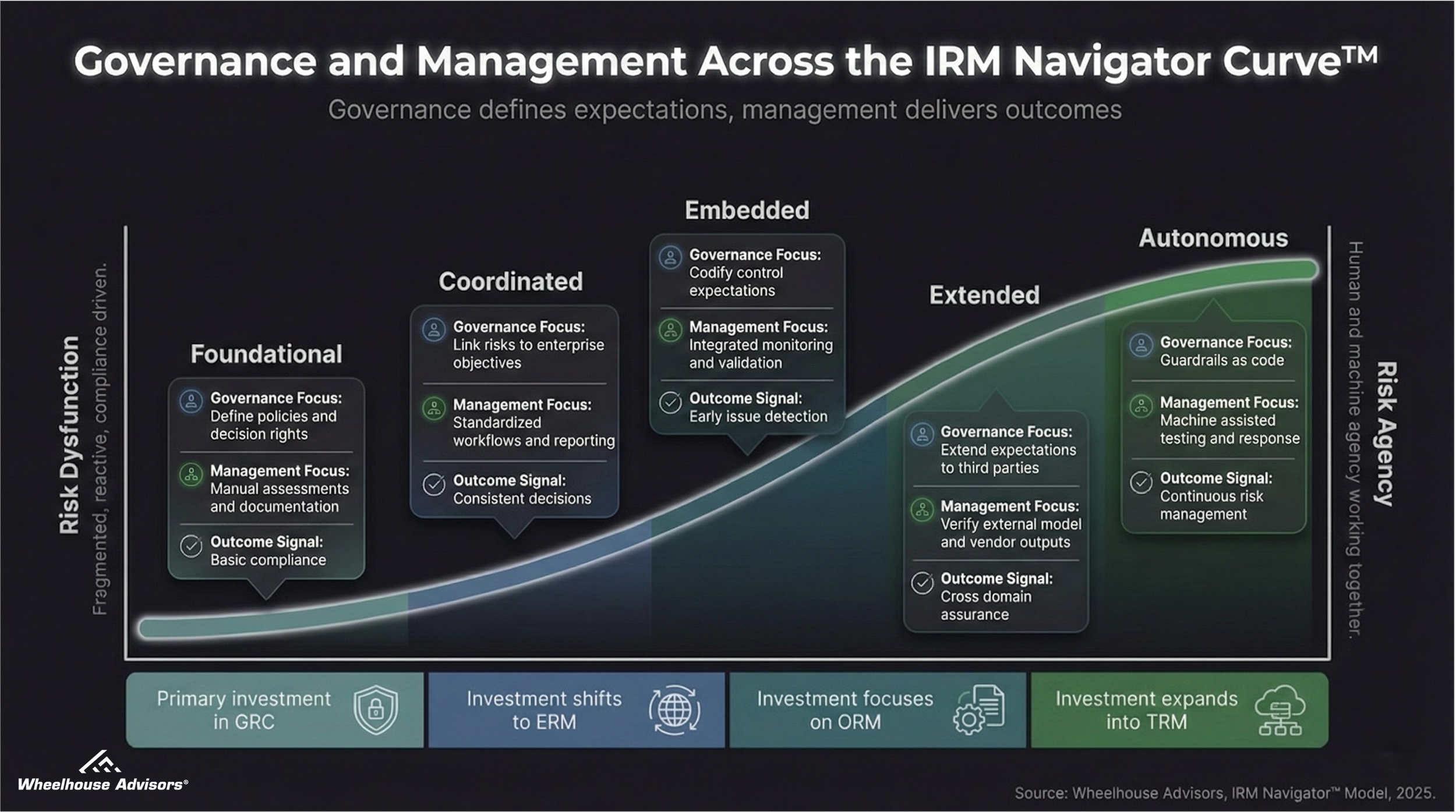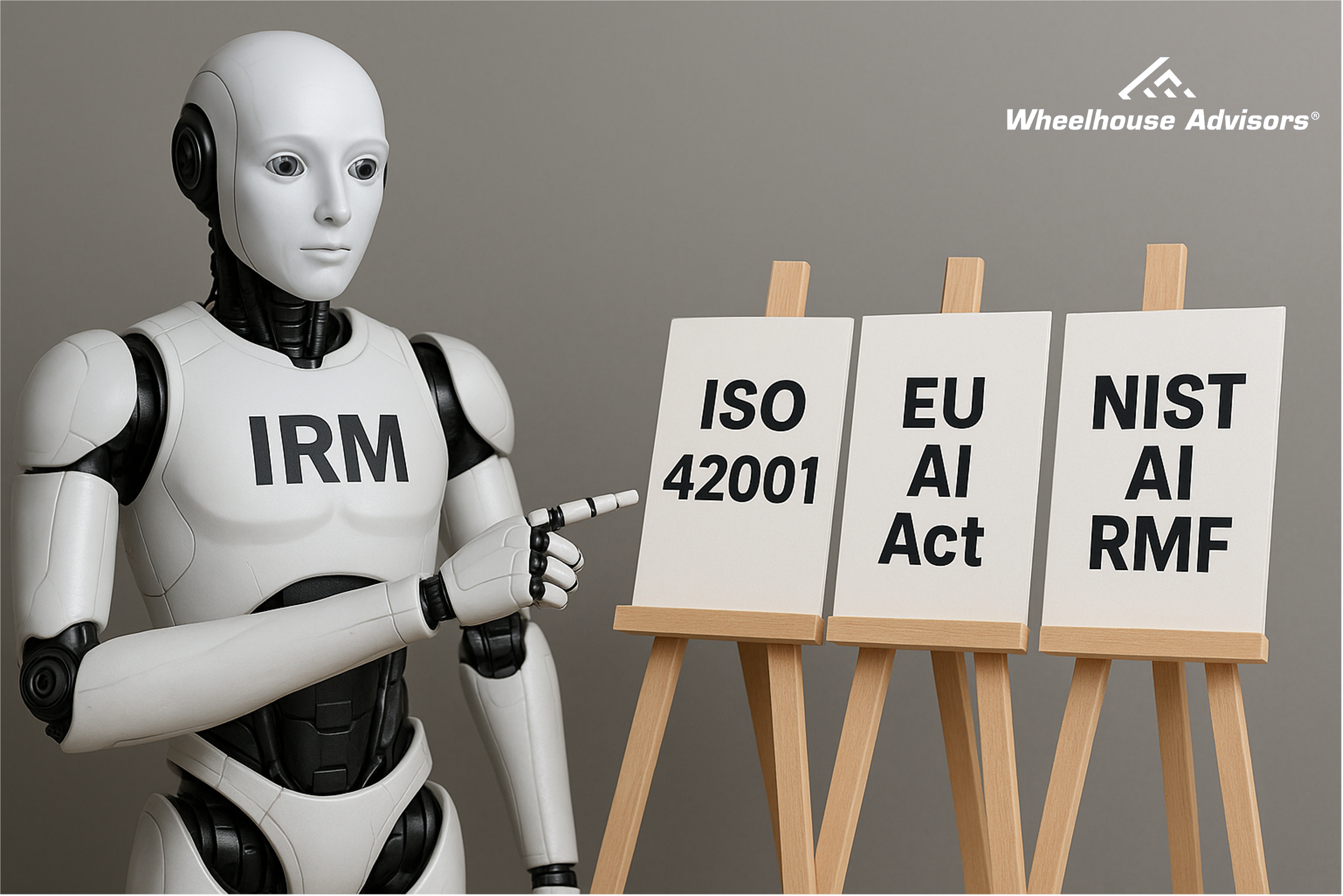
Click here to access subscription content at The RTJ Bridge - The Premium Version of The RiskTech Journal
〰️
Click here to access subscription content at The RTJ Bridge - The Premium Version of The RiskTech Journal 〰️
The RiskTech Journal
The RiskTech Journal is your premier source for insights on cutting-edge risk management technologies. We deliver expert analysis, industry trends, and practical solutions to help professionals stay ahead in an ever-changing risk landscape. Join us to explore the innovations shaping the future of risk management.

WEF Claims AI Governance is a Growth Strategy
The recent World Economic Forum argument that “effective AI governance” is now a growth strategy is directionally correct, and also incomplete in a way that will matter for buyers in 2026. The claim is correct because governance reduces friction, clarifies accountability, and increases repeatability as AI moves from pilots to enterprise scale. The claim is incomplete because many organizations are calling the entire operating model “AI governance,” when the value is realized only when governance is translated into management execution.

RiskTech Buyer Trap - When “Next Gen SaaS” Signals Foundation Rebuild, Not Integration Maturity
The GRC and broader RiskTech platform landscape is in a visible transition cycle. Several large vendors are rebranding portfolios, introducing AI capabilities, and emphasizing SaaS-first delivery and modern user experiences. Buyers often interpret these moves as a direct signal of near-term integration maturity, faster operational embedding, and “out of the box” IRM outcomes.
That interpretation can be costly.
The more reliable buyer lens is to recognize that platform modernization usually follows a sequenced transformation path, and integration maturity tends to become repeatable only after the new baseline stabilizes across SaaS delivery, experience, and extensibility.

The Real AI Test: How to Tell a Platform from a Chat Overlay
Most vendors now claim to have “AI platforms,” but many are just chat interfaces placed on top of disconnected systems. The difference is more than marketing. Without the right controls, these overlays can leak data, bypass policies, and mislead buyers into thinking they are getting enterprise-grade AI governance when they are not.

Executive Comparison of AI Governance Frameworks for Risk & Compliance
Artificial Intelligence (AI) is becoming integral to enterprise operations and risk management, including emerging Autonomous IRM (Integrated Risk Management) initiatives where AI agents autonomously assist in identifying and managing risks. Executives and boards need to ensure such AI deployments are trustworthy, compliant, and aligned with business objectives. Several frameworks have emerged to govern AI risk and compliance. Below is a comparison of three key frameworks – ISO/IEC 42001 (the new AI Management System standard), the EU AI Act (forthcoming European regulation), and the NIST AI Risk Management Framework (RMF) (a U.S. voluntary guideline) – focusing on what executives should understand, monitor, and prioritize in each.

Generative AI Is Steering Banks Toward Autonomous IRM—But the Bridge Isn’t Finished Yet
When McKinsey & Company published “How generative AI can help banks manage risk and compliance” in March 2024, it put blue-chip credibility behind a growing consensus: large-language models and related GenAI tools will automate swaths of the three-lines-of-defense and up-end conventional governance, risk, and compliance (GRC) workflows. What McKinsey did not say—but unmistakably implied—is that the old compliance-first paradigm is now on borrowed time. The firm’s use-case catalogue—from virtual regulatory advisors to code-generating “risk bots”—maps neatly onto the early layers of Autonomous Integrated Risk Management (IRM): continuously sensing risk, generating controls, and feeding decision-grade insight back into the business.
Yet the report also reveals a tension. McKinsey still frames GenAI as a helper inside discrete risk silos, guarded by human-in-the-loop checkpoints. Autonomous IRM envisions something bolder: an AI-directed control fabric that dissolves those silos, embeds itself in front-line processes, and—over time—lets the machine take the first swing at routine risk decisions while humans govern the exceptions.

AI Insurance Emerges as Chatbot Failures Highlight New Liabilities
In a notable development reflecting AI’s increasing integration into business operations, insurers at Lloyd’s of London have launched specialized coverage for losses caused by artificial intelligence tool failures. This initiative, spearheaded by Armilla, a startup backed by Y Combinator, underscores growing corporate concerns about the unpredictable and costly errors AI-powered tools can generate, particularly chatbots and customer service platforms.

Live from RSA: Autonomous IRM Moves from Vision to Reality
The RSA Conference is renowned for highlighting significant shifts in cybersecurity and risk management. This year, alongside familiar conversations about persistent cybersecurity threats and regulatory pressures, a deeper transformation is occurring: the rise of Autonomous Integrated Risk Management (Autonomous IRM). Vendors at RSA 2025 are showcasing solutions that go beyond merely automating routine tasks, moving toward independently identifying, assessing, and mitigating risks across enterprise ecosystems without constant human intervention.

The AI Wild West is Over — Why IRM Must Now Govern the Frontier
When John A. Wheeler and Avivah Litan collaborated as colleagues at Gartner, they shared a simple but powerful conviction: technology without governance invites risk, and risk without context invites disaster. That belief feels more urgent than ever in the age of generative AI.
This month, Avivah returned to the spotlight with a compelling Gartner webinar titled “A Partner Framework to Manage AI Governance, Trust, Risk and Security.” It laid out a comprehensive vision for AI Trust, Risk, and Security Management (AI TRiSM), exposing the vulnerabilities of current AI adoption strategies and presenting a future where organizations no longer treat AI oversight as optional.
But here’s the problem: most companies are still stuck in a fractured model of Governance, Risk, and Compliance (GRC). And the rise of autonomous, agentic AI systems is about to make that dysfunction terminal.

From Code to Conduct: UK Cyber Mandate and Tech Disruption Signal a Governance Reckoning
Two significant announcements this week—one from the UK government and the other from Deloitte—highlight a rapidly converging future in which cybersecurity, advanced technology, and corporate governance are no longer siloed concerns but integrated imperatives for the boardroom. While distinct in origin and focus, both developments send a clear signal: the pressure on executive leaders to govern technology risks with discipline, foresight, and accountability is mounting.

Audit at the Edge: Governing AI Before It Governs You
Artificial intelligence is no longer a side project buried in IT. It’s now embedded in decision-making processes across finance, operations, marketing, and customer service. From algorithmic underwriting to autonomous workforce tools, AI is transforming how businesses operate—and how they fail. Yet for many organizations, Internal Audit remains stuck in the past: buried in compliance checklists, siloed in function, and reliant on legacy Governance, Risk, and Compliance (GRC) systems incapable of keeping pace.

AI's Risk Reckoning: How Integrated Risk Management Can Prevent Catastrophe
Organizations must adopt a structured, enterprise-wide approach to AI risk governance to balance AI's opportunities and risks. Integrated Risk Management (IRM) provides the governance framework to manage AI risks holistically, aligning AI implementation with corporate strategy, regulatory compliance, cybersecurity, and operational resilience.

The Future of Risk Management - How AI Agents Are Transforming IRM
Artificial Intelligence (AI) agents are revolutionizing Integrated Risk Management (IRM) by enabling organizations to detect, analyze, and mitigate risks autonomously. Unlike traditional risk management frameworks that rely heavily on manual assessments and static controls, AI-driven solutions enhance speed, accuracy, and adaptability, reducing financial losses, security breaches, and compliance failures.

The Challenges of AI Agents and Why Risk Management Matters
Artificial intelligence (AI) agents are being promoted as game-changers for businesses, helping automate tasks, reduce costs, and improve efficiency. However, recent research from CB Insights shows that many companies using AI agents face three significant problems: unreliable performance, complex integration with existing systems, and lack of uniqueness among different AI solutions. These issues highlight why businesses need Integrated Risk Management (IRM)—a structured way to handle risks related to AI, including security, compliance, and performance challenges. Without proper oversight, AI agents can cause more harm than good.

Distilled Intelligence or Compressed Catastrophe? The High-Stakes Risks of Shrinking AI
Their is a great deal of hype about distilled AI, an emerging technique that trims down massive machine learning models into leaner, cheaper versions. While these distilled “student” models may look—and sometimes perform—much like their full-fledged AI counterparts, a closer inspection reveals a labyrinth of potential flaws: from amplified bias and reduced accuracy to hidden legal liabilities.

The Digital Risk Paradox - Why Corporate Digitalization Could Be Your Biggest Liability
Digital transformation has long been heralded as the corporate world's silver bullet—promising efficiency, resilience, and competitive advantage. However, emerging research suggests a more unsettling reality: the rush to digitalize may create as many risks as it mitigates.

Moving Fast and Breaking Things - The Hidden Risks of AI's Silent Upgrades
In recent months, an increasing number of organizations across finance, healthcare, and technology sectors have encountered significant disruptions caused by seemingly minor updates to their AI-driven tools. For instance, compliance teams at major financial institutions faced confusion and heightened regulatory exposure when an incremental update to their AI language models altered interpretations of regulatory guidance overnight. Without clear prior communication from the AI vendor, these subtle but impactful changes created significant operational uncertainty and regulatory scrutiny.

How Companies Can Employ AI for Compliance and Risk Management—Safely and Effectively with IRM
To fully realize AI’s potential while mitigating its risks, organizations must adopt an Integrated Risk Management (IRM) approach that provides governance, oversight, and strategic alignment between AI deployment and risk management objectives. IRM ensures that AI-driven compliance processes are not only efficient but also secure, transparent, and adaptable to regulatory changes.
